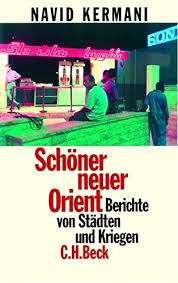“The best of journalism.”
Elisabeth Kiderlen, Badische Zeitung
“Kermani does more than simply file a report. He stage produces his narratives, transforms research into mini-dramas with heroes and villains, sheriffs and martyrs and the most astonishing turns of events. Shakespeare would have enjoyed reading his work.”
Stefan Weidner, Die Zeit

War as a business venture, cities which organize their own demise, the capital of the largest Muslim country as a temple of consumerism, religious extremism as the most treacherous form of globalization – the Orient traveled by Navid Kermani has as little to do with fairy tales from 1001 Nights as with sinister clichés about Allah’s bearded warriors.
The world which emerges in his reporting is modern, even frighteningly modern. In many respects it prefigures conditions which could also threaten our own affluent societies if centrifugal forces should gain the upper hand.
Ever more comprehensively-structured government regulates our lives economically, technologically and politically, rendering our living conditions similar and creating conformity in our values.
At the same time the gap widens between the countries, regions or the sections of cities which can no longer keep up with the pace of development, finally becoming utterly decoupled from our reality – and ultimately re-imposing themselves in our awareness with renewed violence.
Informative, sobering, and irritating, Navid Kermani’s brilliant reports make the seeming irrationality of the Orient understandable, its strangeness disquietingly familiar.
From Egypt to Indonesia the author guides us through all areas of the Islamic world which are the focus of interest today: the Near East as well as Central Asia, both Iran and Pakistan.
Despite his precision in describing specific situations and individuals, his conclusions always have implications which exceed the topics of his reports. His analyses are drawn from concrete experiences, and they pertain to our world as well.